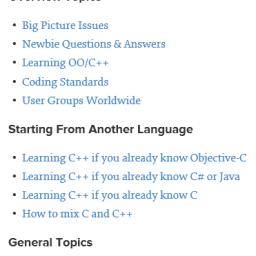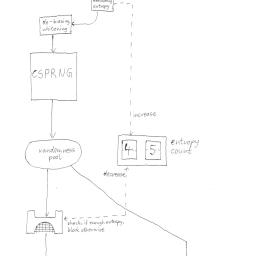
The Standard C++ Foundation has put together a new "unified" C++ FAQ, combining Marshall Cline's popular FAQ, Bjarne Stroustrup's FAQ pages, and many other sources.
The Foundation's announcement is a good introduction to what they're trying to do, and after you've read that,
check out the FAQ itself .
[Note -- I've already found a few places where the integration of all these sources is less than perfect. I suspect it will be a little while before all the necessary editing is complete. They are accepting both suggestions and volunteers.]
Remember the first time you heard about Google's
Summer of Code ? Well, time flies:
Google's well-liked summer coding internship program is celebrating its 10th year. And it's got a lot to be proud of.
What is likely to remain the same this year is the overwhelming response from students from all over the world who want the chance to work on free and open source projects with mentoring organizations that Google has hand-picked. Carol Smith, Open Source Programs Manager at Google, tells us that to date GSoC students have helped generate over 50 million lines of open source code to date, from over 8,500 student developers.
Previous summers of code have helped the KDE and FreeBSD projects advance in useful and significant ways, and it's brought a huge number of young programmers into the open source ecosystem, a good thing by any measure. Here's hoping the next ten years of the Summer of Code lead us to bold and interesting places! Or at least help us build the tools that enable us to avoid the robot apocalypse. Whichever.
Well-known Linux vendor and IT shop Wind River knows the "Internet of Things" is just around the corner, and is
positioning its interesting VxWorks Real Time Operating System (RTOS) to be there when it happens. VxWorks is already in use on embedded systems around the world, and it might be coming to a toaster near you soon.
If you have not heard of VxWorks,
Wikipedia has more info about the Intel-owned company that is quietly putting its 'Intel Inside' mark on over 1.5 billion devices, including NASA's Curiosity rover on Mars.
Wind River redesigned VxWorks so it features two kernels, one for large processors and the other, a micro-kernel, for smaller processors, like the kind that would power edge devices with low compute capacity. The micro-kernel is only 20KB, and can run on 32-bit processors (though not 8-bit or 16-bit processors).
How much longer before our refrigerators flash 'insert coin'?

The differences between /dev/random and /dev/urandom have spawned some misconceptions.
This article attempts to explain some of the myths surrounding this perplexing random number device.
Also of interest, is a
report on weak entropy in key generation, especially during bootup, and
another report on the aftermath of Debian's recent OpenSSL vulnerability.
GitHub is stepping into the text editor arena with
Atom. Although the editor acts as a web application, the project is using a specialized variant of Chromium to render itself as a native application. This allows Atom to access local resources, like a file system browser, where a normal web application would have security restrictions.
For this reason, we didn't build Atom as a traditional web application. Instead, Atom is a specialized variant of Chromium designed to be a text editor rather than a web browser. Every Atom window is essentially a locally-rendered web page.
Not too much to see yet, but you can visit the
landing page to sign up for the beta.
Borgodoro started to make opensource chocolate inspired by famous opensource projects, the first two had been
VideoLan and
Libav .
The Chocolate recipes are available on github and they have LGPL as "moral license", claiming that this way everybody can make additional recipes out of the chocolate.
The ingredients that make up the chocolate are also available so people has no excuses to experiment and issue pull requests!

